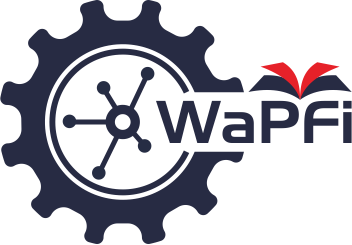Identification of science process skills of class XI students in the Torricelli theorem practicum using dynamic fluid learning media
Abstract
This research aims to determine the level of science process skills of Class XI MA Al-Bairuny Jombang students at the Torricelli Theorem Practicum. This research emphasizes developing students' abilities to analyze the data that has been found. This research is a type of quantitative research with a research model, namely descriptive quantitative research with a one-shot case study design. The research population was students of class XI MA Al-Bairuny Jombang and the research sample used a purposive sampling technique and obtained a total of 20 students of class Data collection was obtained using observation sheets (practicum) and Science Process Skills assessment sheets during learning. The research results were analyzed descriptively quantitatively based on classroom observations. The research results showed that the percentage of students' Science Process Skills in the Torricelli Theorem Practicum with a result of 88.0% was in the very good category. It is proven from the SPSS version 22 statistical calculation test that the percentage of Science Process Skills in the Torricelli Theorem Practicum is 0.232 > 0.05 so it can be said that the data is distributed normally. Apart from that, it is also proven by the results of the significance value of 0.246 > 0.05 so it can be said that the data is distributed with homogeneous variance. This research makes it possible to improve the quality of learning, especially physics subjects, by integrating learning materials and media so that student's understanding of concepts and science process skills is increased.This research aims to determine the level of science process skills of Class XI MA Al-Bairuny Jombang students at the Torricelli Theorem Practicum. This research emphasizes developing students' abilities to analyze the data that has been found. This research is a type of quantitative research with a research model, namely descriptive quantitative research with a one-shot case study design. The research population was students of class XI MA Al-Bairuny Jombang and the research sample used a purposive sampling technique and obtained a total of 20 students of class Data collection was obtained using observation sheets (practicum) and Science Process Skills assessment sheets during learning. The research results were analyzed descriptively quantitatively based on classroom observations. The research results showed that the percentage of students' Science Process Skills in the Torricelli Theorem Practicum with a result of 88.0% was in the very good category. It is proven from the SPSS version 22 statistical calculation test that the percentage of Science Process Skills in the Torricelli Theorem Practicum is 0.232 > 0.05 so it can be said that the data is distributed normally. Apart from that, it is also proven by the results of the significance value of 0.246 > 0.05 so it can be said that the data is distributed with homogeneous variance. This research makes it possible to improve the quality of learning, especially physics subjects, by integrating learning materials and media so that student's understanding of concepts and science process skills is increased.
Downloads
References
Ahmed, M., Choudhary, F. R., and Sultan, S. (2023). a Comparative Study of Basic Science Process Skills of Science Students At Higher Secondary Level in District Rawalpindi, Pakistan. Jurnal Pendidikan IPA Indonesia, 12(2), 276–285. https://doi.org/10.15294/jpii.v12i2.37775
Angelia, Y., Supeno, S., and Suparti, S. (2022). Keterampilan Proses Sains Siswa Sekolah Dasar dalam Pembelajaran IPA Menggunakan Model Pembelajaran Inkuiri. Jurnal Basicedu, 6(5), 8296–8303. https://doi.org/10.31004/basicedu.v6i5.3692
Arikunto, S. (2010). Prosedur Penelitian Pendekatan Praktik Edisi Revisi VI. In Rineka Cipta.
Ariyansyah, A., and Nurfathurrahmah, N. (2022). Analisis Keterampilan Proses Sains Melalui Metode Berbasis Masalah Pada Materi Keanekaragaman Mahluk Hidup. JUPEIS : Jurnal Pendidikan Dan Ilmu Sosial, 1(2), 105–109. https://doi.org/10.55784/jupeis.vol1.iss2.48
Astalini, Darmaji, Kurniawan, D. A., Wirayuda, R. P., Putri, W. A., Rini, E. F. S., Ginting, A. A. B., and Ratnawati, T. (2023). Impact of Science Process Skills on Thinking Skills in Rural and Urban Schools. International Journal of Instruction, 16(2), 803–822. https://doi.org/10.29333/iji.2023.16242a
Baharom, M. M. (2020). Integration of Science learning Apps based on Inquiry Based Science Education (IBSE) in enhancing Students Science Process Skills (SPS). International Journal of Interactive Mobile Technologies (IJIM), 14(9), 95–109. https://doi.org/https://doi.org/10.3991/ijim.v14i09.11706
Bulent, A., Mehmet, E., and Nuran, E. (2014). The investigation of science process skills of elementary school teachers in terms of some variables: Perspectives from Turkey. AsiaPacific Forum on Science Learning and Teaching, 15(1).
Bybee, R. W., and DeBoer, C. E. (2001). Research on goals for the science curriculum. In Gabel (4.eds.), Handbook of Research on Science Teaching and Learning (4th ed.). National Science Teachers Association.
Dari, R. W., and Nasih, N. R. (2020). Analisis Keterampilan Proses Sains Mahasiswa Pada Praktikum Menggunakan E-Modul. Edu Sains:Jurnal Pendidikan Sains Matematika, 8(2), 12–21. https://doi.org/10.23971/eds.v8i2.1626
Darmaji, D., Kurniawan, D. A., Astalini, A., and Rini, E. F. S. (2022). Science Processing Skill and Critical Thinking: Reviewed Based on the Gender. Jurnal Pendidikan Indonesia, 11(1). https://doi.org/http://dx.doi.org/10.23887/jpi-undiksha.v11i1.35116.
Dolapcioglu, S., and Subası, M. (2022). The Relationship Between Scientific Process Skills and Science Achievement: A Meta-Analysis Study. Journal of Science Learning, 5(2), 363–372. https://doi.org/10.17509/jsl.v5i2.39356
Hardianti, R. D., and Permatasari, I. U. (2023). Promoting Students’ Science Process Skills Through Predict Discuss Explain Observe Discuss Explain Implementation. Unnes Science Education Journal, 12(1), 1–6. https://doi.org/10.15294/usej.v12i1.65648
Harlen, W. (1999). Purpose and procedures for assessing science process skills. Assessment in Education: Principles, Policy & Practice, 6(1), 129–144. https://doi.org/https://doi.org/10. 1080/09695949993044
Jannah, N. L., Nursalim, M., & Sujarwanto, S. (2022). Representation Analysis of Science Process Skills With a Neuropsycological View at Elementary School. EDUTEC : Journal of Education And Technology, 6(1), 61–68. https://doi.org/10.29062/edu.v6i1.422
Kurniawati, A. (2021). Science Process Skills and Its Implementation in the Process of Science Learning Evaluation in Schools. Journal of Science Education Research, 5(2), 16–20. https://doi.org/10.21831/jser.v5i2.44269
Lisa, F. Y. (2019). Analisis Ketrampilan Proses Sains Peserta Didik Pada Mtaeri Laju Reaksi Melalui Model Inquiry Labolatory. Jurnal Tadris Kimiya, 2(Desember), 226–236. doi: http://doi.org/10.15575/jtk.v4i2.5669
Maison, Darmaji, Astalini, Kurniawan, D. A., and Indrawati, P. S. (2019). Science process skills and motivation. Humanities and Social Sciences Reviews, 7(5), 48–56. https://doi.org/10.18510/hssr.2019.756
Manurung, S. R., and Panggabean, D. D. (2020). Improvinng Students’ Thinking Ability in Physics Using Interactive Multimedia Based Problem Solving. Cakrawala Pendidik, 39(2), 460–470. https://doi.org/https://doi.org/10.21831/cp.v39i2.28205.
Putra, I. A., and Sujarwanto, E. (2017). Analisis Keterampilan Proses Sains Peserta Didik Melalui Bahan Ajar Multimedia Interaktif Alat. Momentum: Physics Education Journal, 1(2), 91–102. https://doi.org/http://dx.doi.org/10.21067/mpej.v1i2.2013
Putri, D. H., and Suratno, M. (2013). Model Kegiatan Laboratorium Berbasis Problem Solving Pada Pembelajaran Gelombang Dan Optik Untuk Meningkatkan Keterampilan Proses Sains Mahasiswa. Exacta, X(2), 148– 155.
Rahmah, Y., Nasir, M., and Azmin, N. (2019). Penerapan Model Pembelajaran 5E Untuk Meningkatkan Keterampilan Proses Sains Dan Sikap Ilmiah Siswa Kelas VIII SMP NEGRI 6 KOTA Bima. ORYZA (Jurnal Pendidikan Biologi), 8(2), 40–46.
Rini, E. F. S., and Aldila, F. T. (2023). Practicum Activity: Analysis of Science Process Skills and Students’ Critical Thinking Skills. Integrated Science Education Journal, 4(2), 54–61. https://doi.org/10.37251/isej.v4i2.322
Sheeba, M. N. (2013). An Anatomy of Science Process Skills In The Light Of The Challenges to Realize Science Instruction Leading To Global Excellence in Education. Educationia Confab.
Sugiyono. (2014). Metode Penelitian Pendidikan Pendekatan Kuantitaif, Kualitatif, dan R&D. In Metode Penelitian Pendidikan Pendekatan Kuantitaif, Kualitatif, dan R&D. Alfabeta. https://doi.org/10.1007/s13398-014-0173-7.2
Sujarwanto, E., & Putra, I. A. (2018). Investigasi Keterampilan Proses Sains Terintegrasi Mahasiswa Pendidikan Fisika Universitas KH. A. Wahab Hasbullah. Momentum: Physics Education Journal, 2(2), 79–85.
Temel Aslan, S., and Ertaş Kılıç, H. (2022). Explicit Teaching of Science Process Skills: Learning Outcomes and Assessments of Pre-service Science Teachers. Mimbar Sekolah Dasar, 9(3), 446–465. https://doi.org/10.53400/mimbar-sd.v9i3.45795
Utami, N. H., Riefani, M. K., Sarah, S., and Musliha. (2021a). Basic Science Process Skills in Senior High School for Solve Wetlands Problems. Proceedings of the 2nd International Conference on Social Sciences Education (ICSSE 2020), 525(Icsse 2020), 444–447. https://doi.org/10.2991/assehr.k.210222.075
Widayanti, E. Y. (2016). Penguasaan Keterampilan Proses Sains Dasar Siswa Madrasah Ibtidaiyah (Studi Pada Madrasah Mitra Stain Ponorogo). Kodifikasia, 9(1), 171. https://doi.org/10.21154/kodifikasia.v9i1.465
Yildirim, A., Yalcin, Y., Sengoren, S. K., Tanel, R., Saglam, M., & Kavcar, N. (2011). A Study on the Student Teachers Acquisition of Science Process Skills. Eurasian Journal of Educational Research, 44(44), 203–218.






